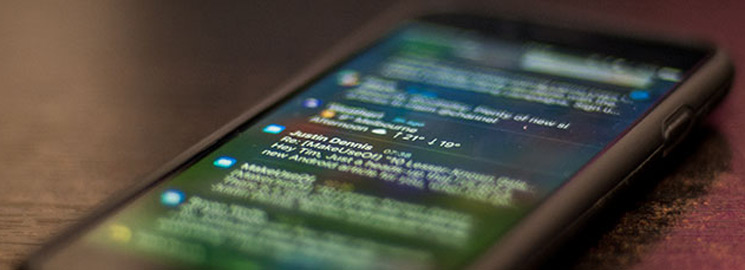No doubt, you’ve got lots of apps installed on your phone. Maybe several messaging apps, popular social media ones, the aspirational workout program or two, notes, to-dos, more games than you would like to admit, and of course the obligatory texting and email apps. Chances are, one of them just sent you a notification in the last few seconds and that is because developers of these apps want you to install them and use their product; C-O-N-S-T-A-N-T-L-Y. Wouldn’t it be great if there was one place in this digital dystopia that did not notify you?
For me, notifications are a lot like when someone at work comes up to you and says “did you see that email I sent you?” Studies show, the more often that happens, the more we will start ignoring that person at work, and apps with notification are very much the same way. And so, the more busy we are in the run of a day and the more we get interrupted with certain apps, the more we tend to get frustrated and anxious.
I know for myself and students in the classroom, maintaining focus for 50-60 mins is a tremendous challenge and getting interrupted in the classroom, whether it’s me or any of my students with any kind of notification is an unnecessary distraction that affects the flow of learning; which is the main reason why phones are not to be taken out in my class.
I think you can tie all of these notification back to the fear of missing out. You don’t want to be the last person to hear about something in a world of instant messages. And so, that drives us to keep the notification on.
This is a really interesting question and problem to try and solve. I think that is why I enjoy my Kindle so much because it is just like a book, it has no notifications by default and so I can just go and read without interruptions.
I’ve just finished my masters exit paper and included in it I dedicated one chapter to this exact dilemma. Elizabeth Dunn is a professor of psychology at the university of B. C. and she has researched the effect notifications have on our well being and her findings show that notifications can be very distracting mainly affecting our focus in a way that would have some downstream negative consequences.
I know for some people especially the younger generation, adding notifications can make them feel anxious and draining especially if they miss out on notifications from their friends.
That feeling of being distracted and not fully being present in the moment, seems to have many consequences removing the good feeling situation into a bad feeling situation simply because we forgot or were late responding to someone.
In addition, Dunn’s research also indicates that notifications might actually replicate some of the symptoms of Attention Deficit Hyperactivity Disorder, better known as ADHD. That said, she is quick to share that notifications from our technology is not the root cause of ADHD, still her research found that reducing notification, surprise, surprise, can help everyone focus better and it might also help improve your relationships. Further research from her is showing that when people turn off notifications they experience reductions in the feeling of distraction. Distraction, in turn, is a real problem for social connection.
I think it might be hard to turn everything off, since there are certain notifications we might deem absolutely necessary. And so, I think the issue is for most people comes when all of these notifications are turned on by default and we don’t really take the time to customized each app based on notification priority. And so, the best advice seems to be that people need to setup a careful screen of all their apps determining which ones should notify you and which ones should not.
I think the bottom line here is comes down to prioritizing your encounters with technology that are actually making us happy and recognizing that just because a technology is popular or convenient doesn’t mean it is actually good for you.


Leave a Reply